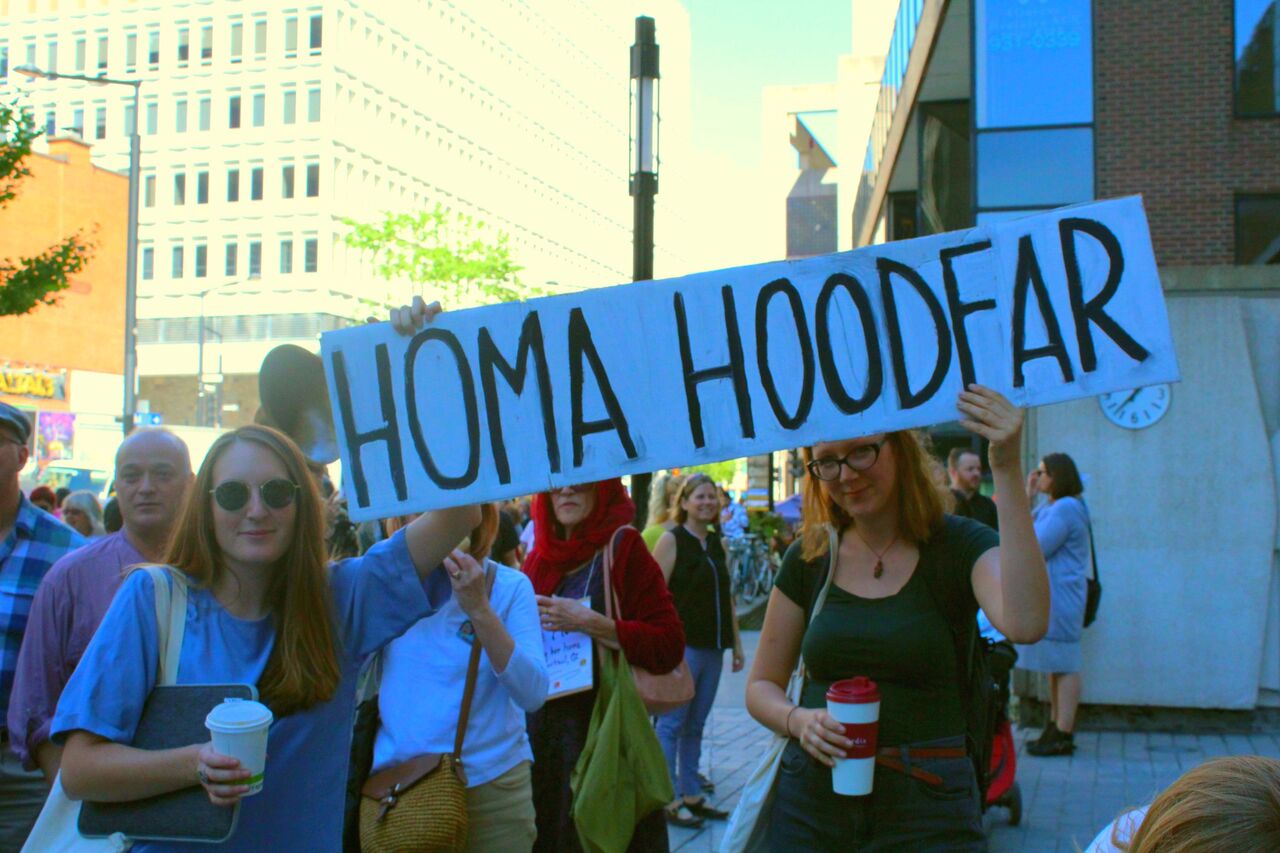Announcers demand Hoodfar’s release after 107 days of imprisonment
Concordia students, faculty and community members gathered across the street from Bethune Square to raise awareness of the incarceration of former Concordia professor, Homa Hoodfar, who has been jailed in Evin prison in Iran for 107 days.
Hayley Lewis, the event organizer, said not only is it unclear what Hoodfar is being charged with, but it is also unclear as to what condition she is currently in. “All that we know is she’s a 65-year-old woman who we love, who has been in prison for 107 days and who is in extremely bad health,” Lewis said.
“Please keep talking about Homa Hoodfar,” Lewis announced to a group of over 100 protesters. “Post about her, write about her—do not let her disappear.” Lewis emphasized the importance of pressing the Canadian and Irish governments to see to Hoodfar’s safe and definite release.
Lewis said Hoodfar suffers from a degenerative neurological disorder that requires medication, but she has not been getting said medication while imprisoned. “She is sick, she is unwell and we need her back,” said Lewis.
Lewis invited guests from the Concordia community to speak—Concordia faculty members, personal friends of Hoodfar and Green Party Leader and Concordia student Alex Tyrrell spoke at the demonstration. They all stood in solidarity for the immediate release of Hoodfar. Lewis also invited the Bread and Puppet theatre, a Vermont-based group, who presented a theatrical political performance to spectators in support of Hoodfar’s safe return home.
“We have a moral responsibility to get her home,” said Kimberley Manning, principal of the Simone de Beauvoir Institute and a member of the recently-organized Homa Hoodfar working group. She said that since Hoodfar’s arrest, the Concordia union faculty association, the Concordia administration and two of Hoodfar’s closest friends have been supporting efforts to free her. However, Manning said they still need lots of help.
“Homa taught here for 30 years, nurturing several decades of students and contributing [in] countless ways to the wellbeing of this institution,” said Manning. “Now it’s our turn to help her.”
Manning said action is being taken in Dublin as well, as Concordia professor Emer O’Toole from the department of Irish studies helped mobilize the protest for Hoodfar in front of the Iranian embassy, which took place in Dublin on Sept. 7. “[O’Toole] has been working tirelessly to place pressure on the Irish government to do all they can do to get Homa free,” said Manning.
“Members of the Concordia community and the public should not underestimate the gravity of what’s taking place here,” said Tyrrell. “Her life is on the line.” He added that she has been held in solitary confinement without access to a lawyer.
Tyrrell said Hoodfar’s research aimed to help develop an understanding of Muslim women, one of the most discriminated against groups locally and globally. Tyrrell said the community has an obligation to stand up for imprisoned peers and to defend academic freedom around the world.
Margie Mendell, Professor and Graduate Program Director for School of Community and Public Affairs and a friend of Hoodfar said we must get Hoodfar home and out of Evin prison. “We will not gather again to say that she has been in Evin prison for 200 days,” Mendell said to the crowd. “We will gather together to welcome her home and to celebrate her freedom.”
Fay Devlin, one of Hoodfar’s former students, said “I do not think this is going to do anything,” emphasizing that the community needs to do more for this cause. She suggested students should use social media and share photos to help spread awareness. “Sign the petition,” she said.
“I think public demonstrations of this type are very necessary, but they’re not sufficient by any means,” said Peter Stoett, the director of Loyola Sustainability Research Centre and political science professor at Concordia University. He said Hoodfar’s release depends more on the negotiation between the governments involved—namely, the Canadian, Irish and Iranian governments.
“We can’t fool ourselves into thinking it’s going to change the government of Iran—their perspective is pretty hardened on this, and that’s going to take some serious diplomatic maneuvering,” said Stoett. Lewis, however, encourages people to get involved and write letters to the government.
“The final purpose of this [demonstration] is just to celebrate Homa’s work, and remember what an outstanding woman she is and the brutality of the situation she’s in right now,” Lewis said. She said that the more people who are informed the better. “There are a lot of political prisoners all over the world—we want to stand in solidarity with them, as well.”
With files from Cristina Sanza
